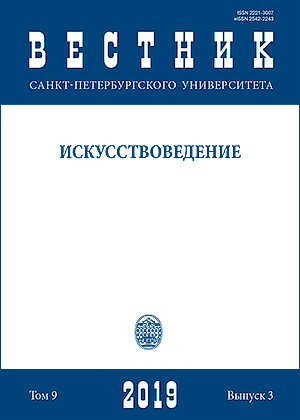Paul Delaroche: The Reception of his Work in Russia
DOI:
https://doi.org/10.21638/spbu15.2019.308Abstract
Despite the existing body of literature on Paul Delaroche, this article is the first attempt to seriously assess his reception in nineteenth-century Russia. A study of how Delaroche was received by Russian critics, collectors and artists allows us take a new look both at the scale of his significance for nineteenth-century art as a whole and at certain key aspects of Russian artistic culture. The author analyses reviews of Delaroche’s work in the Russian press, including some never previously discussed, and comments on Horace Vernet’s celebrated statement that: “The emperor [Nicholas I] spoke with me at length about Delaroche. He has all his prints”. Looking at Anatoly Demidov’s patronage of Delaroche, the article also touches on the Russian collector’s relations with the tsar. The new concept of the “genre historique” that originated with Delaroche was taken up and developed most productively in Russia in the 1860s and 1870s, as the author demonstrates through an analysis of paintings by Vyacheslav Schwarz and Nikolay Ge, noting that their treatment of subjects from history was possible only in the more liberal age of Alexander II. It was under Delaroche’s influence that both Schwarz and Ge created typologically new images of power and of the monarch (of Ivan the Terrible and Peter the Great). In conclusion, the author draws attention to the paradoxical nature of Western self-identification by Russian nineteenth-century artists, which can be explained in part through a study of the Russian reception of the art of Delaroche.
Keywords:
nineteenth-century Russian art, nineteenth-century French art, Russian-French artistic relations, historicism, realism, Paul Delaroche, Karl Bryullov, Vyacheslav Schwarz, Nikolay Ge
Downloads
References
Sources
Downloads
Published
How to Cite
Issue
Section
License
Articles of "Vestnik of Saint Petersburg University. Arts" are open access distributed under the terms of the License Agreement with Saint Petersburg State University, which permits to the authors unrestricted distribution and self-archiving free of charge.






